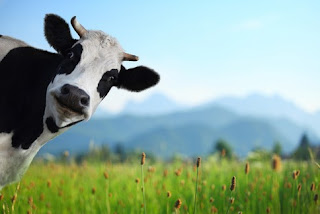So, as you can see protein is a very important part of our diet. However, just how much protein do you really need?
Low carb - high protein diets are very fashionable at the moment, and you will often find advice saying that you should include protein at every meal, which brings up another huge question:
Where do you get protein from?
Well, the first thing that tends to spring to mind when talking about protein is a nice juicy steak, chicken, fish, eggs... etc...
But let's go back to the first question, how much protein do you really need?
The Recommended Daily Allowance (RDA) for protein is set at about 0.75 - 0.8g per kilogram of body weight. This means that if you are a woman weighing around 58k you would need 43.5g of protein per day. Or a man weighing 75k you would need 56.2g of protein per day.
I you think that an average steak weighs about 225g ... then you may just come to the conclusion that we are eating way too much protein, and you'd be right.
In fact even the RDA for protein is way too high and a new lower figure of 0.6g per kilogram of bodyweight would be enough. However, this is a generalization as there are different groups with different needs. Children, older people, pregnant women, athletes and anyone recovering from surgery would need more protein. But that would mean about 1.5 - 2g of protein per kilogram of bodyweight per day.
Too much protein can lead to certain problems such as weight gain, reduced liver and brain function, high cholesterol. Too much protein can lead to your body producing too much ammonia, a toxin that your liver makes turns into non toxic - too much protein over a prolonged period means your liver can become over worked. Too many toxins in your body can lead to a decline in brain function. However it is hard to tell from the available information if they are talking about animal or plant protein or both.

As I said before we tend to think of protein in the animal form, but we also get protein from vegetable sources such as spinach, kale, broccoli, cauliflower, mushrooms, parsley, cucumbers, green pepper, cabbage, and tomatoes, for example. And other sources such as legumes, dairy products, nuts and whole grains and fruit.
If we also throw into the equation that the agricultural sector is the world's second largest emitter of greenhouse gas thanks to the methane produced by livestock, then you might want to do yourself - and the planet a favor; switch to much more plant orientated diet.
Some like to call this a "flexitarian" diet which means less animal products and more plant foods. Many people have become vegetarian or vegan over time, but this isn't always appealing to everyone, but there are ways you can lower your animal intake and up your plant intake.
Some families are already adopting the "meatless Monday" approach, or others who just have fruit or vegetables for dinner and have their animal protein at breakfast or lunch.
But you don't need to worry about falling short of your protein intake. Many other foods on our weekly shopping lists are full of protein:
Food: Protein Content (g)
Slice of toast with butter 3.7
Large bowl of porridge with milk 14.7
Banana 1.2
Apple 0.6
Salad and tomatoes 1.7
Greek Yogurt 8.6
Frozen Peas 5.5
Potatoes 3.1
Mushrooms 0.6
Peanuts (28g) 6.7
Almonds (28g) 6.0
Tofu (140g) 11.0
Blueberries (1 bowl) 1.10
Apricots (1 fresh) 0.49
Dates (100g) 2.50
Broccoli (1/2 cup) 2.0
Spinach (1 cup cooked) 5.0
Another swap to reduce your animal produce intake is to swap cow's milk for other milks: almond milk, oat milk, coconut milk, rice milk, walnut milk, etc.
By all means, eat meat, fish, chicken, eggs, etc.. but one important piece of advice; when you look at the food you are about to eat, make sure there are more vegetables than anything else on your plate.
I can help you improve your health. If you would like to make an appointment with me either in person or via Skype, just send me an email to lucycarr@socialnutrition.com


















